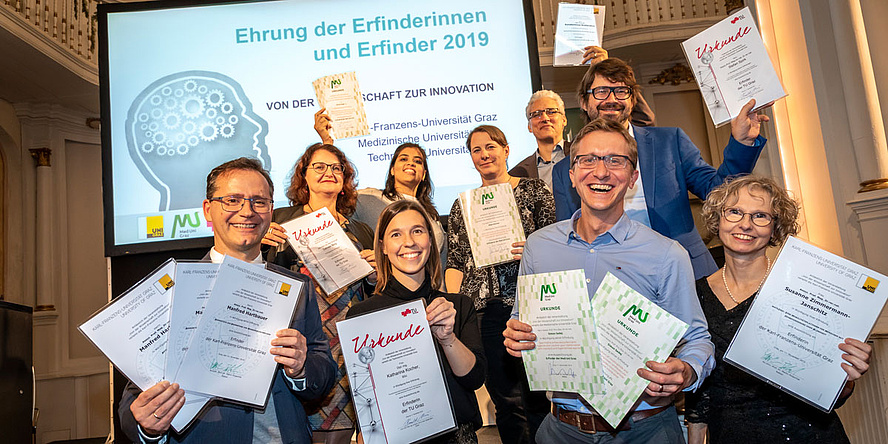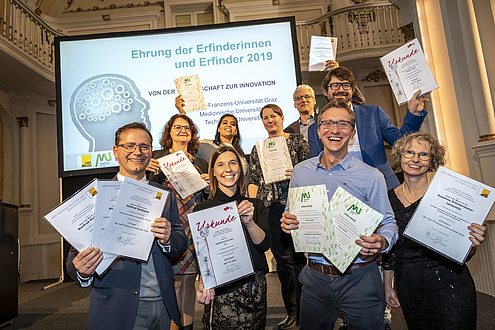Since 2015, the Medical University of Graz, Graz University of Technology and the University of Graz have been honouring particularly "inventive" researchers in a joint ceremony every two years. 260 scientists were invited to the third occasion of this award, whose inventive talent produced no less than 169 invention disclosures and 71 patent applications between July 2017 and June 2019. The three Graz universities have thus recorded a total of around 1200 inventions over the past fifteen years.
Hellmut Samonigg (Rector of the Medical University of Graz), Martin Polaschek (Rector of the University of Graz) and Horst Bischof (Vice Rector for Research at Graz University of Technology) underlined in their welcoming addresses the importance of these achievements for Styria: "Universities are places of innovation. Inventions and patents are an essential factor in the measurability of innovation in research. Applicable technologies produced by the research work of our scientists are a guarantee of social progress and an essential basis for a strong, efficient economy."
Competent support: from the idea to the patent application
Technology transfer and research exploitation require a bridge to industry. The respective service departments at the universities provide support here. The Research & Technology House of TU Graz, the Research Management of the University of Graz and the Research Management of Medical University of Graz help researchers in all project phases and make a significant contribution to the development of technological innovations from research, which ultimately lead to patent applications or even to successful company start-ups.
From science to innovation
Three success stories from health research were presented as examples at the festive event.
TU Graz researchers Ingo Klimant and Sergey Borisov from the Institute of Analytical Chemistry and Food Chemistry developed biochemical sensor products for the medical technology sector together with the Graz branch of B.Braun Melsungen AG. The founding of the research and development division of B.Braun Melsungen AG in Graz was the result of an EU-funded project with a Graz focus.
An invention was successfully licensed to the biotechnology company Gilupi GmbH at the Medical University of Graz. Amin El-Heliebi, head of the research group at the Department of Cell Biology, Histology and Embryology, has developed a detection method with which resistance to therapy in prostate cancer can be detected at an early stage. He is concentrating on the search for biomarkers that show in advance whether the standard therapy will be effective or whether another form of therapy is necessary.
The Longevity Labs – a spin-off of the University of Graz – distributes spermidineLIFE throughout Europe. This is a product containing spermidine that slows down cell ageing in the body and prevents age-related diseases. The research results of Frank Madeo and Tobias Eisenberg provided the basis for this. The two researchers from the Institute of Molecular Biosciences at the University of Graz identified spermidine as the first non-toxic substance that prolongs the lifespan and health span of various organisms.
The following inventors were honored yesterday*
TU Graz
Raimund ALMBAUER, Mario AUER, Markus BAINSCHAB, Georg BAUMANN, Christian BAUMGARTNER, Marcel Carsten BAUNACH, Gabriele BERG, Martin BLODER, Carlo Alberto BOANO, Sebastian BOCK, Wolfgang BÖSCH, Günter BRENN, Thomas BRETTERKLIEBER, Helmut BRUNNER, Bernd CERMENEK, Mark DOKTER, Andreas DUTZLER, Andreas EGGER, Bernd EICHBERGER, Philipp Simon EISELE, Norbert ENZINGER, Lothar FICKERT, Friedrich FRAUNDORFER, Stefan FREUNBERGER, Bernhard FREYTAG, Michael FUCHS, Michael Ernst GADRINGER, Markus Alfons GEITH, Georg GESCHEIDT-DEMNER, Anton GLIEDER, Christoph GRIMMER, Bernhard GROßWINDHAGER, Andreas GRUBER, Michael HAAS, Georg HANSEMANN, Dominik HILBER, Rainer HOFMANN, Christian HOLLY, Gerhard HOLZAPFEL, Christoph HOLZINGER, Timucin David KARACA, Imre KARACSONYI, Roland KIRCHBERGER, Mario KLIMACEK, Stefan KOCH, Katharina KOCHER, Peter KOPSCH, Robert KOURIST, Thomas LAINER, Michael LANG, Stefan LEITNER, Werner LIENHART, Michael LUKESCH, Franz Michael MAIER, Paul MAIERHOFER, Christoph MONSBERGER, Mohammad Bagher NASIRI, Robert NEUBAUER, Markus NEUMAYER, Kay Domenico NOVAK, David PFEIFER, Harald PICHLER, Stefan POSCH, Matthias RAUDACHL, Matthias Julian REBHAN, Daniel RETTENWANDER, Martin RIEGER, Roger RIEWE, Kay Uwe RÖMER, Hermann SCHARFETTER, David SCHINAGL, Werner SCHLEMMER, Dieter SCHMALSTIEG, Robert SCHMID, Thomas SCHMID, Helmut SCHREIBER, Jörg SCHRÖTTNER, Helmut SCHWAB, Christoph Wilhelm SENSEN, Mateusz SKALON, Gerhard SOMMER, Lutz SPAROWITZ, Stefan SPIRK, Eduard STADLER, Christian STEGER, Franz STELZER, Philipp STELZER, Michael STOCKER, Andreas STRASSER, Harald STÜGER, Stefan STURM, Joshua Paul TAPLEY, Franz TESCHL, Mario THEISSL, Anton TILZ, Gregor TRIMMEL, Andreas TRUMMER, Franz TSCHUCHNIGG, Michael VORDERDERFLER, Bernhard WALZEL, Astrid WENINGER, Frank WIESBROCK, Andreas WOLFSCHLUCKNER, Robert ZACHARIAS, Gerald ZOTTER
Med Uni Graz
Mahmoud ABEDELLATIF, Emmanouil AGRAFIOTIS, Ruth BIRNER-GRÜNBERGER, Shruti DAGA, Nicole GOLOB-SCHWARZL, Wolfgang GRAIER, Ellen HEITZER, Roland MALLI, Katrin PANZITT, Simon SEDEJ, Gerald SEIDEL, Tamara TOMIN, Albert WÖLFLER
Uni Graz
Maria-Anna BAUER, Marcello CARIONI, Didac CARMONA-GUTIERREZ, Doris DALLINGER, Tobias EISENBERG, Gernot GRABNER, Manfred HARTBAUER, Katharina KAINZ, Christian Oliver KAPPE, Konstantinos KOSTARAKOS, Wolfgang KROUTIL, Andreas KUNGL, René LEBL, Frank MADEO, Karina PREISS-LANDL, Philipp ROYER, Ziad SALEM, Thomas SCHMICKL, Stefan SCHÖNWETTER-FUCHS-SCHISTEK, Werner SEEBACHER, Martin STEFANEC, Christoph WINKLER, Robert ZIMMERMANN, Susanne ZIMMERMANN-JANSCHITZ
(260 scientists were invited, those 143 attended the ceremony)


